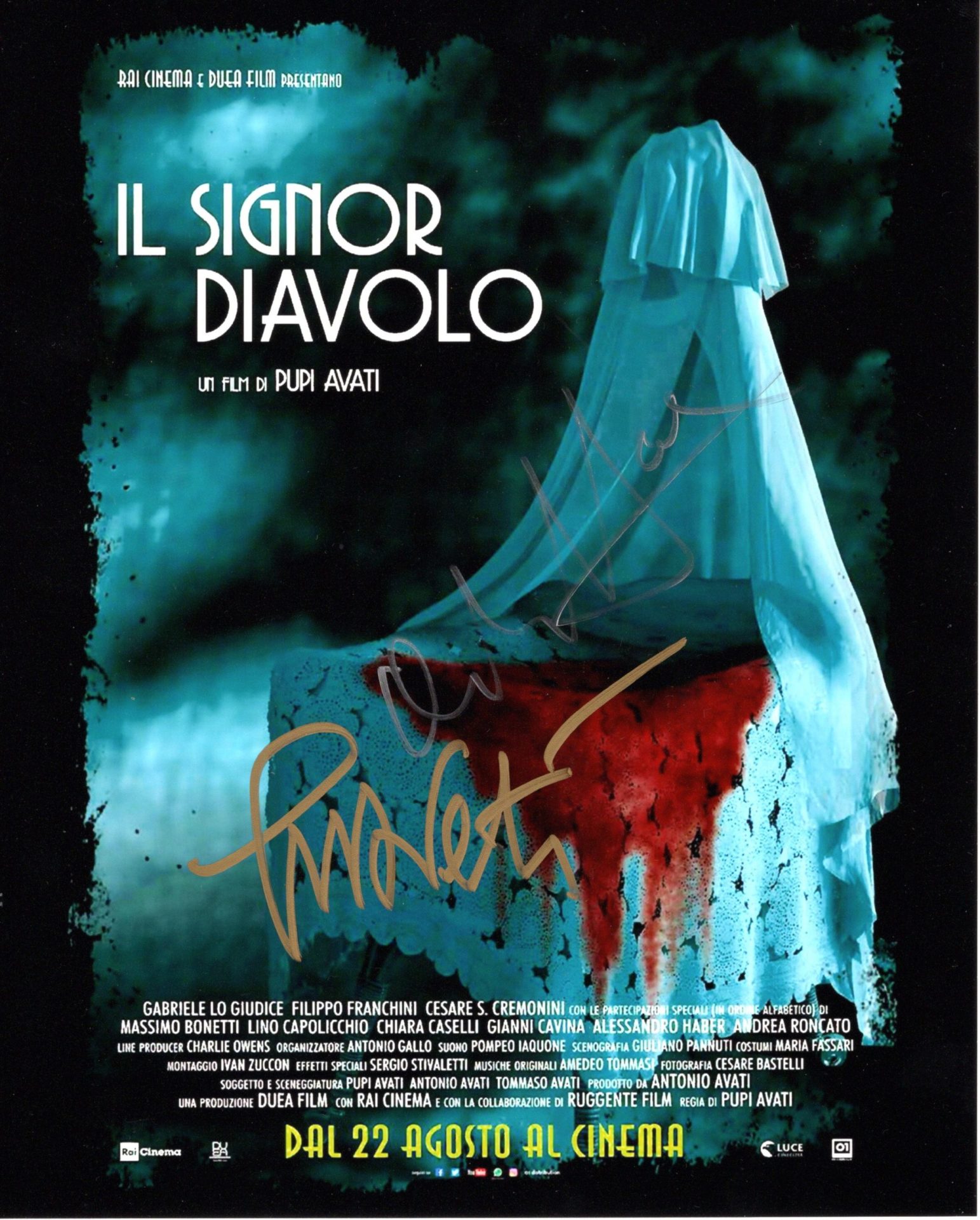Alessandro Haber and Pupi Avati – Signed Photo – Il signor Diavolo
Foto con autografo di Alessandro Haber e Pupi Avati.
Dimension: 20 Cm x 25 Cm (Appr.) – 8 x 10 Inches (Appr.)
Movie: Il signor Diavolo (2019)
Date and Place of Signing (Alessandro Haber): November 21, 2021 in Pescara, PE (Italy)
Date and Place of signing (Pupi Avati): January 22, 2020 in Chieti, CH (Italy)
This is not a vintage photo or old one. This photo is new, printed and signed in recent years and the signature is original.
Deals ends in:
$129,00
Description
ALESSANDRO HABER BIOGRAPHY :
Alessandro Haber (born 19 January 1947) is an Italian actor, film director and singer. Haber was born in Bologna in a Jewish family of mixed ancestry (his father was a Romanian Jew and his mother Italian) and spent his childhood in Israel. His movie debut was in 1967 with La Cina è vicina by Marco Bellocchio. His first leading role was in Pupi Avati’s Regalo di Natale. Haber directed his only movie in 2003 with Scacco pazzo. He is also a distinguished theatre actor, having performed amongst others in Orgia by Pier Paolo Pasolini, Woyzeck by Georg Büchner, L’avaro by Molière, Zio Vania by Anton Chekhov, Dialogo by Natalia Ginzburg and Arlecchino by Carlo Goldoni. He has been touring theatres since 2006 with Tango d’amore e di coltelli, with music by Ástor Piazzolla, based on a text by Jorge Luis Borges. He has won three Nastro d’Argento, one David di Donatello, one Premio Gassman, one Premio IDI and one theatre critics’ award. In 2021, the actor was also awarded the Special Nastro d’Argento 2021. As a singer, he has released three albums: Haberrante, Qualcosa da dichiarare and Il sogno di un uomo. His greatest success was the single “La valigia dell’attore”, written for him by Francesco De Gregori. In June 2011 Haber attempted to kiss actress Lucia Lavia onstage during a rehearsal for Othello at the Teatro Romano di Verona. She responded by slapping him and he immediately slapped her back while accusing her of being “cold.” After the intervention of both their lawyers, the theater forced Haber to leave the production and he was replaced by Franco Branciaroli. In 2017 he has interpreted Gabriele Tinti’s poetry giving voice to the masterpieces in the National Archaeological Museum, Naples and in the Capitoline Museums.
Alessandro Haber (born 19 January 1947) is an Italian actor, film director and singer. Haber was born in Bologna in a Jewish family of mixed ancestry (his father was a Romanian Jew and his mother Italian) and spent his childhood in Israel. His movie debut was in 1967 with La Cina è vicina by Marco Bellocchio. His first leading role was in Pupi Avati’s Regalo di Natale. Haber directed his only movie in 2003 with Scacco pazzo. He is also a distinguished theatre actor, having performed amongst others in Orgia by Pier Paolo Pasolini, Woyzeck by Georg Büchner, L’avaro by Molière, Zio Vania by Anton Chekhov, Dialogo by Natalia Ginzburg and Arlecchino by Carlo Goldoni. He has been touring theatres since 2006 with Tango d’amore e di coltelli, with music by Ástor Piazzolla, based on a text by Jorge Luis Borges. He has won three Nastro d’Argento, one David di Donatello, one Premio Gassman, one Premio IDI and one theatre critics’ award. In 2021, the actor was also awarded the Special Nastro d’Argento 2021. As a singer, he has released three albums: Haberrante, Qualcosa da dichiarare and Il sogno di un uomo. His greatest success was the single “La valigia dell’attore”, written for him by Francesco De Gregori. In June 2011 Haber attempted to kiss actress Lucia Lavia onstage during a rehearsal for Othello at the Teatro Romano di Verona. She responded by slapping him and he immediately slapped her back while accusing her of being “cold.” After the intervention of both their lawyers, the theater forced Haber to leave the production and he was replaced by Franco Branciaroli. In 2017 he has interpreted Gabriele Tinti’s poetry giving voice to the masterpieces in the National Archaeological Museum, Naples and in the Capitoline Museums.
PUPI AVATI BIOGRAPHY :
Giuseppe Avati, better known as Pupi Avati (born 3 November 1938), is an Italian film director, producer, and screenwriter. He is known to horror film fans for his two masterpieces of the macabre, The House with Laughing Windows (1976) and Zeder (1983).
Early life and career
Pupi Avati was born in Bologna in 1938. After attending school and studying Political Science at the University of Bologna, he started working at a frozen food company. At the same time, he developed a passion for jazz, becoming a proficient clarinetist. In the second half of the 1950s, he formed and played in the Doctor Dixie Jazz Band, of which Lucio Dalla was also a member. Although he initially intended to be a professional musician, Avati felt he lacked the necessary talent. In the mid-1960s, he decided to dedicate himself to cinema after seeing Federico Fellini’s 8½ and its portrait of the role of a director. Avati’s passion for music, as well as his love for his hometown, which was the setting of many of his films, were to become recurrent themes found in his productions. His filmography as a director includes almost forty films and television works. As a screenwriter, Avati wrote or co-authored the majority of his movies, as well as screenplays for other directors. He cooperated on the script of Salò o le 120 giornate di Sodoma (Salò, or the 120 Days of Sodom, 1976) directed by Pier Paolo Pasolini, even though he is not credited for it.[citation needed] He also produced several films for other directors and in his own work. Many of his movies are also produced by his brother Antonio Avati. Avati began his career directing horror films and is considered one of the most notable Italian directors of this genre, with titles including La casa dalle finestre che ridono (The House with Laughing Windows, 1976) and Zeder (1983), which are considered his masterpieces. According to Avati, the TV series Jazz Band (1978), written about the story of the Doctor Dixie Jazz Band marked a turning point for his work. The subject of his movies began coming from his own experience, and his cinema became more nostalgic, introspective, and autobiographic. Moreover, the series was successful and brought Avati to the attention of a wider public compared to his previous films. Throughout his career, Avati successfully directed and produced many genres of film, including horrors, medieval period pieces, dramas, jazz comedies, buddy comedies, biopics and others, proving himself to be a versatile director. During his career as a director, screenwriter, and producer, Avati was nominated for the Golden Palm, Silver Ribbons, David di Donatello Awards, and many others. He won two David di Donatello Awards and five Silver Ribbons. Avati was nominated Commendatore Ordine al Merito della Repubblica Italiana on 2 June 1995. He has presided over the Federico Fellini Foundation, created in 1995, in memory of the great Rimini-born director. In 2008, Avati published his autobiography, Sotto le stelle di un film, edited by Il Margine. Inspired by the autobiography of the director, in 2010, Claudio Costa made a documentary film of interviews and animations, called Pupi Avati, ieri oggi domani (“Pupi Avati, yesterday today tomorrow”).
Giuseppe Avati, better known as Pupi Avati (born 3 November 1938), is an Italian film director, producer, and screenwriter. He is known to horror film fans for his two masterpieces of the macabre, The House with Laughing Windows (1976) and Zeder (1983).
Early life and career
Pupi Avati was born in Bologna in 1938. After attending school and studying Political Science at the University of Bologna, he started working at a frozen food company. At the same time, he developed a passion for jazz, becoming a proficient clarinetist. In the second half of the 1950s, he formed and played in the Doctor Dixie Jazz Band, of which Lucio Dalla was also a member. Although he initially intended to be a professional musician, Avati felt he lacked the necessary talent. In the mid-1960s, he decided to dedicate himself to cinema after seeing Federico Fellini’s 8½ and its portrait of the role of a director. Avati’s passion for music, as well as his love for his hometown, which was the setting of many of his films, were to become recurrent themes found in his productions. His filmography as a director includes almost forty films and television works. As a screenwriter, Avati wrote or co-authored the majority of his movies, as well as screenplays for other directors. He cooperated on the script of Salò o le 120 giornate di Sodoma (Salò, or the 120 Days of Sodom, 1976) directed by Pier Paolo Pasolini, even though he is not credited for it.[citation needed] He also produced several films for other directors and in his own work. Many of his movies are also produced by his brother Antonio Avati. Avati began his career directing horror films and is considered one of the most notable Italian directors of this genre, with titles including La casa dalle finestre che ridono (The House with Laughing Windows, 1976) and Zeder (1983), which are considered his masterpieces. According to Avati, the TV series Jazz Band (1978), written about the story of the Doctor Dixie Jazz Band marked a turning point for his work. The subject of his movies began coming from his own experience, and his cinema became more nostalgic, introspective, and autobiographic. Moreover, the series was successful and brought Avati to the attention of a wider public compared to his previous films. Throughout his career, Avati successfully directed and produced many genres of film, including horrors, medieval period pieces, dramas, jazz comedies, buddy comedies, biopics and others, proving himself to be a versatile director. During his career as a director, screenwriter, and producer, Avati was nominated for the Golden Palm, Silver Ribbons, David di Donatello Awards, and many others. He won two David di Donatello Awards and five Silver Ribbons. Avati was nominated Commendatore Ordine al Merito della Repubblica Italiana on 2 June 1995. He has presided over the Federico Fellini Foundation, created in 1995, in memory of the great Rimini-born director. In 2008, Avati published his autobiography, Sotto le stelle di un film, edited by Il Margine. Inspired by the autobiography of the director, in 2010, Claudio Costa made a documentary film of interviews and animations, called Pupi Avati, ieri oggi domani (“Pupi Avati, yesterday today tomorrow”).






